Bài giảng Lãnh đạo - Lê Hoàng Minh
CHỨC NĂNG CỦA LÃNH ĐẠO
1. Co ceptua g/ u de sta d g s o nceptualizing/ understanding vision
2. Projecting/ communicating vision in own
context
3. Initiating change/guiding change
4. Mobilizing commitment and support for change
5. Managing change-resolve conflicts and issues
6. Building of trust
7. Build b l ing sustainability-d l h eveloping others
8. Confidence in one’s vision and oneselfLeadership in management
Setting g j oals and objectives
Obtaining the commitment of others to reaching them
Require not only the manager’s basic ability but in
addition the capacity to motivate enthuse energize , enthuse, energize
them to work well and willingly towards goals in which
they believe
– “THE CAPACITY TO SECURE THE WILLING SUPPORT OF PEOPLE
IN ACHIEVEMENT OF THE ORG.’S WORTHWHILE”
Depend on the exercise of interpersonal influence
Th h k bl e proactive approach : taking responsible initiatives to
change situaion and attitudes through the people is
essence of leadership in management
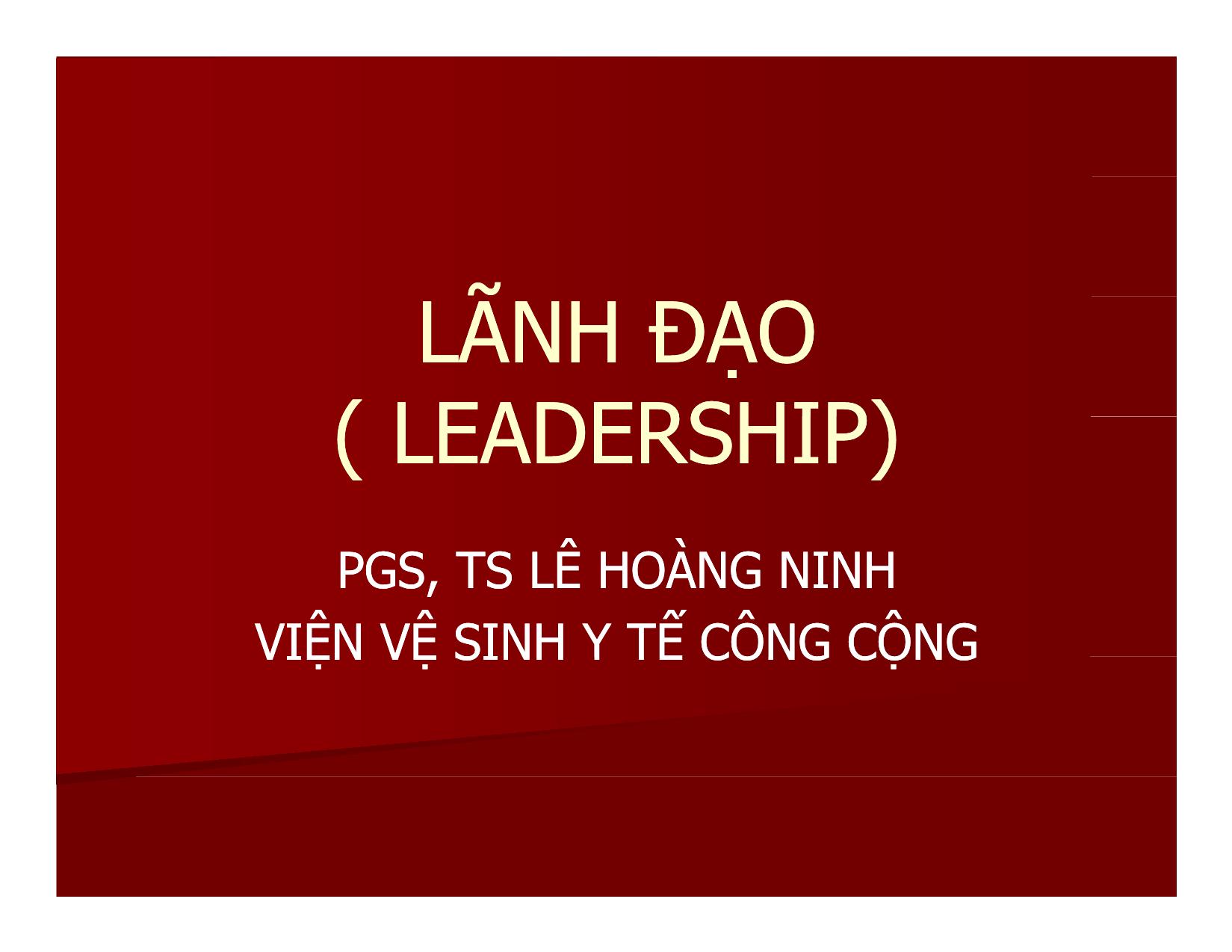
Trang 1
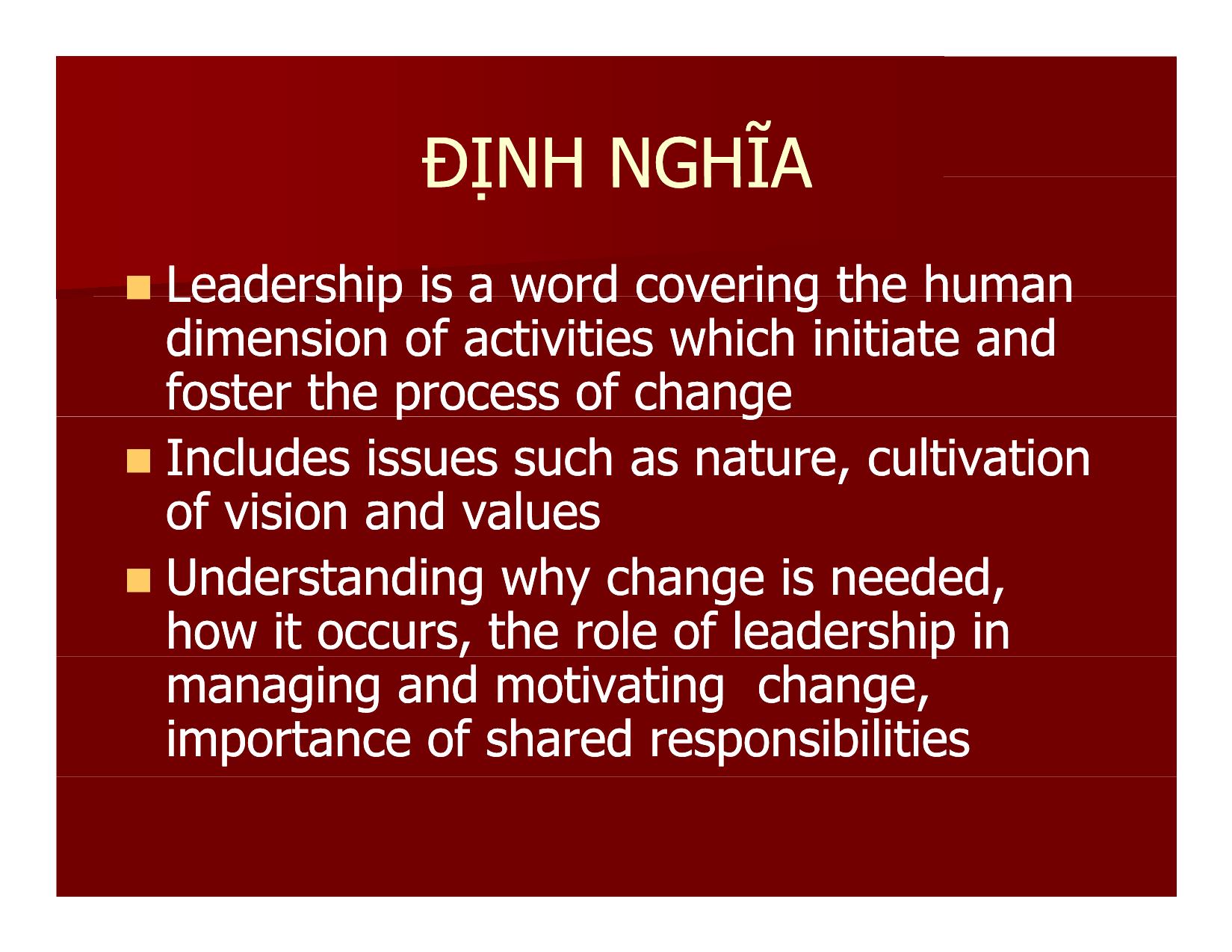
Trang 2
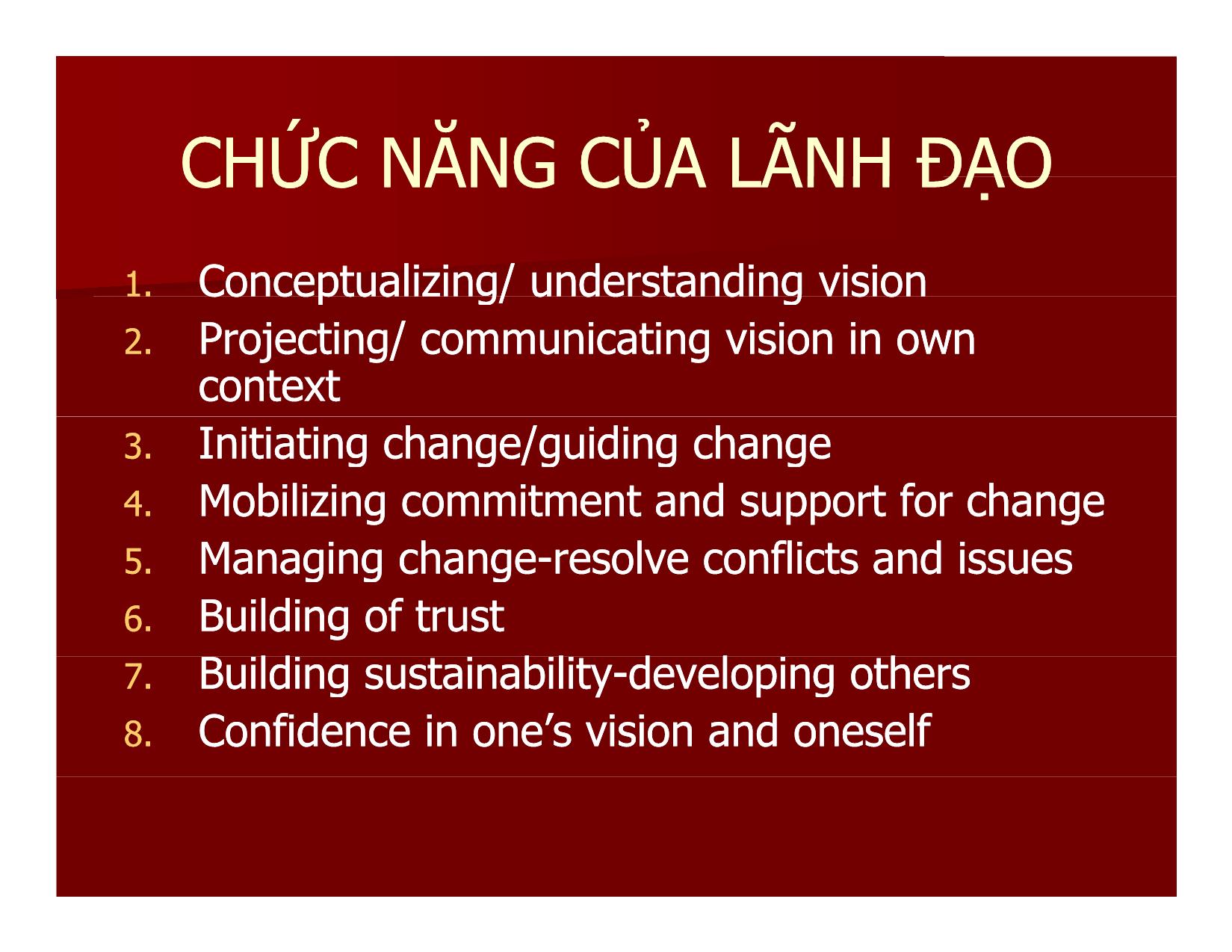
Trang 3
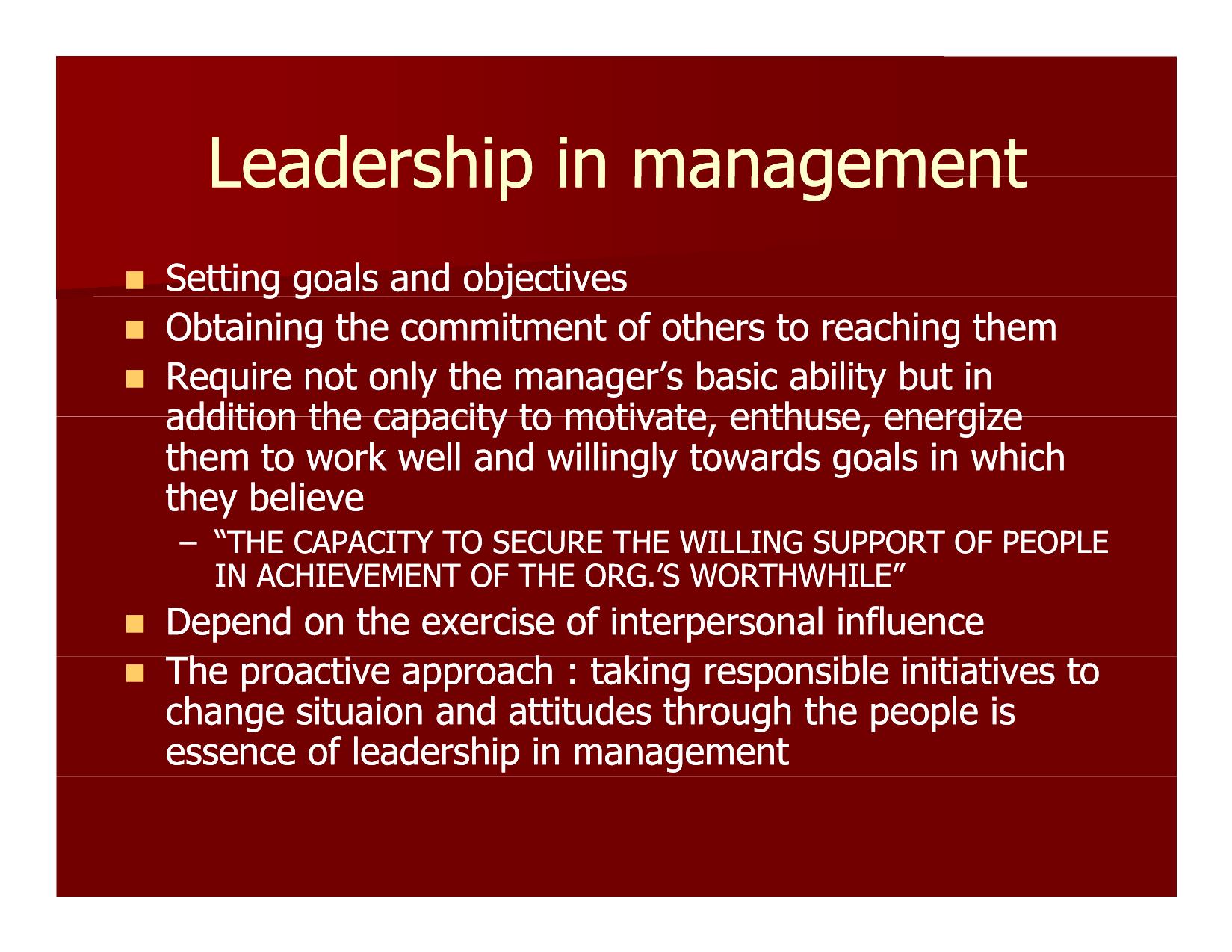
Trang 4
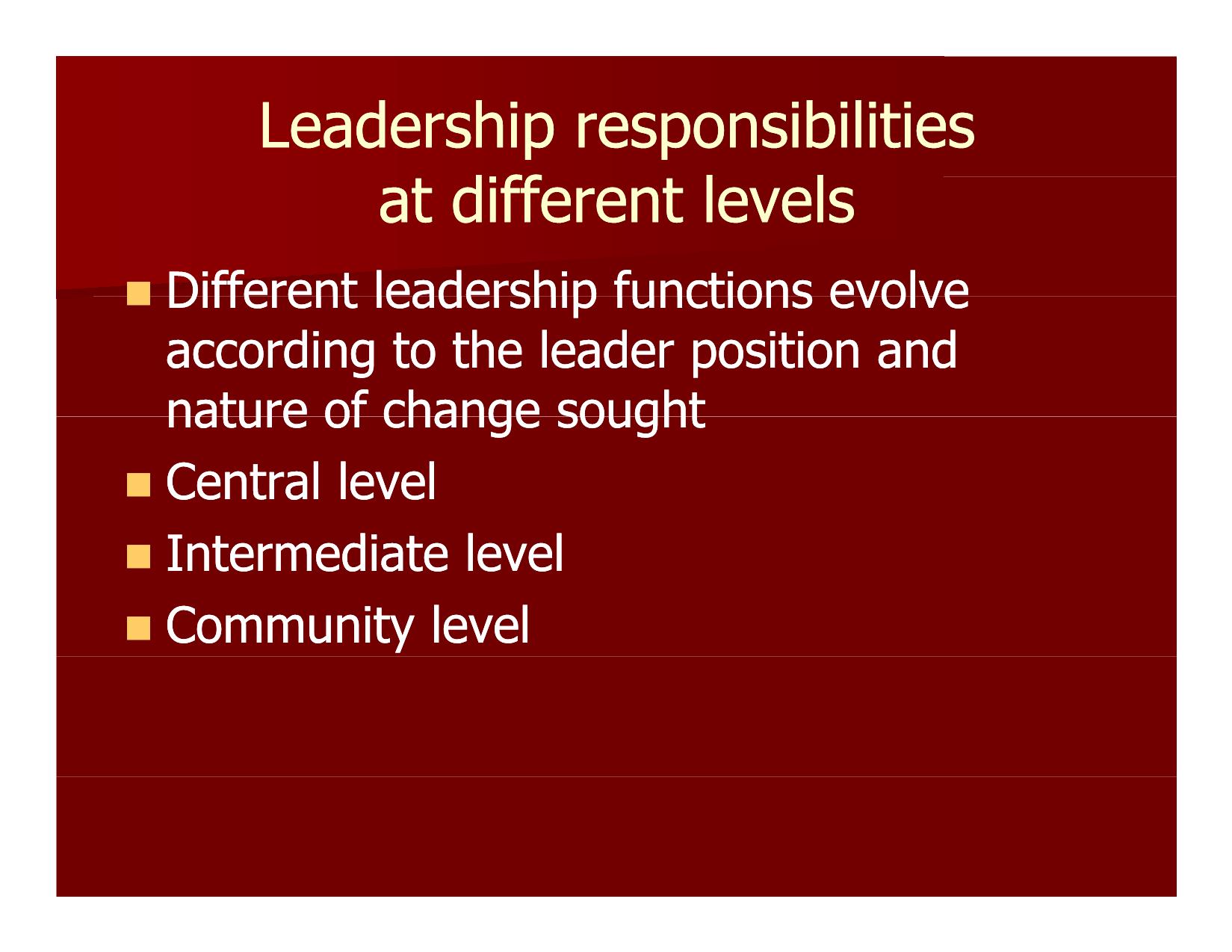
Trang 5
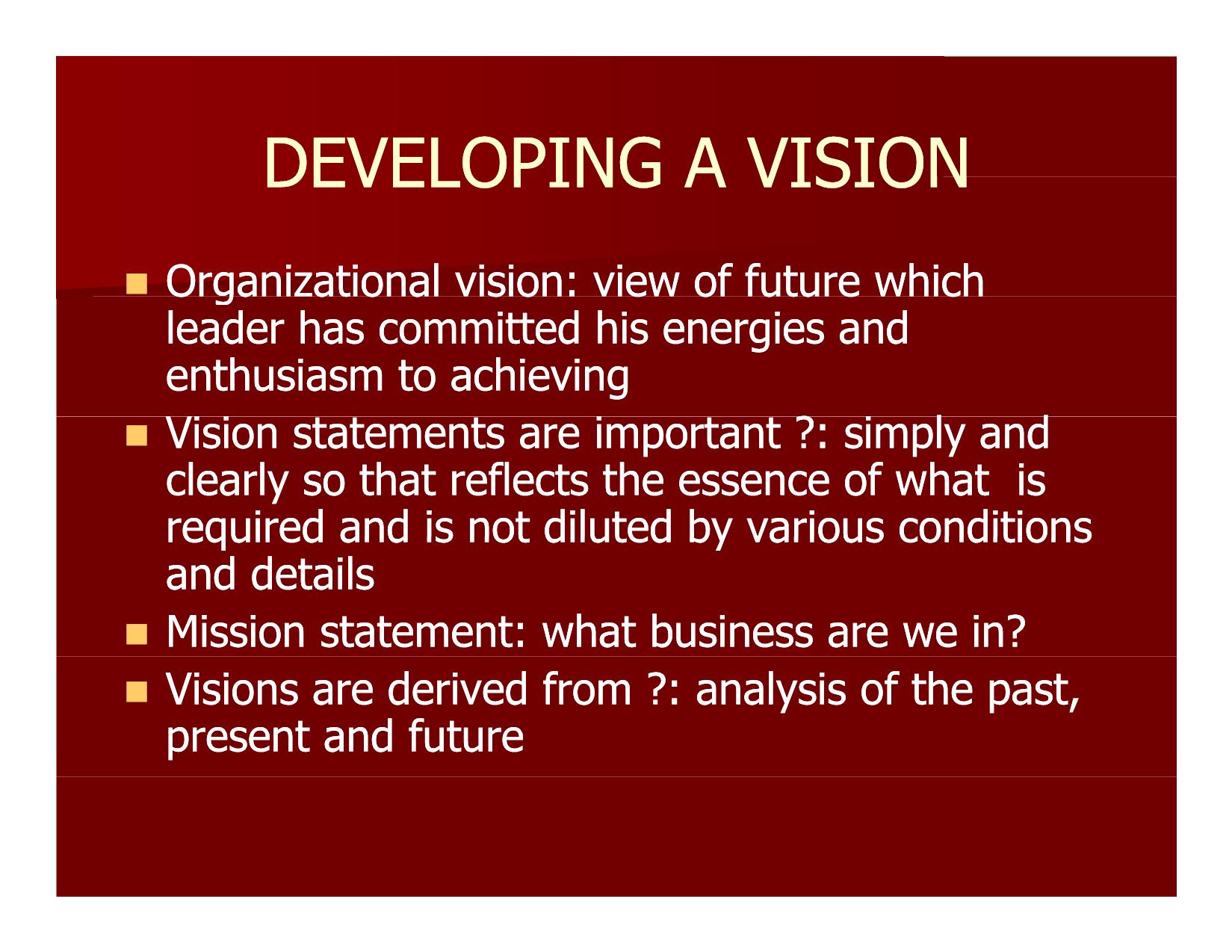
Trang 6
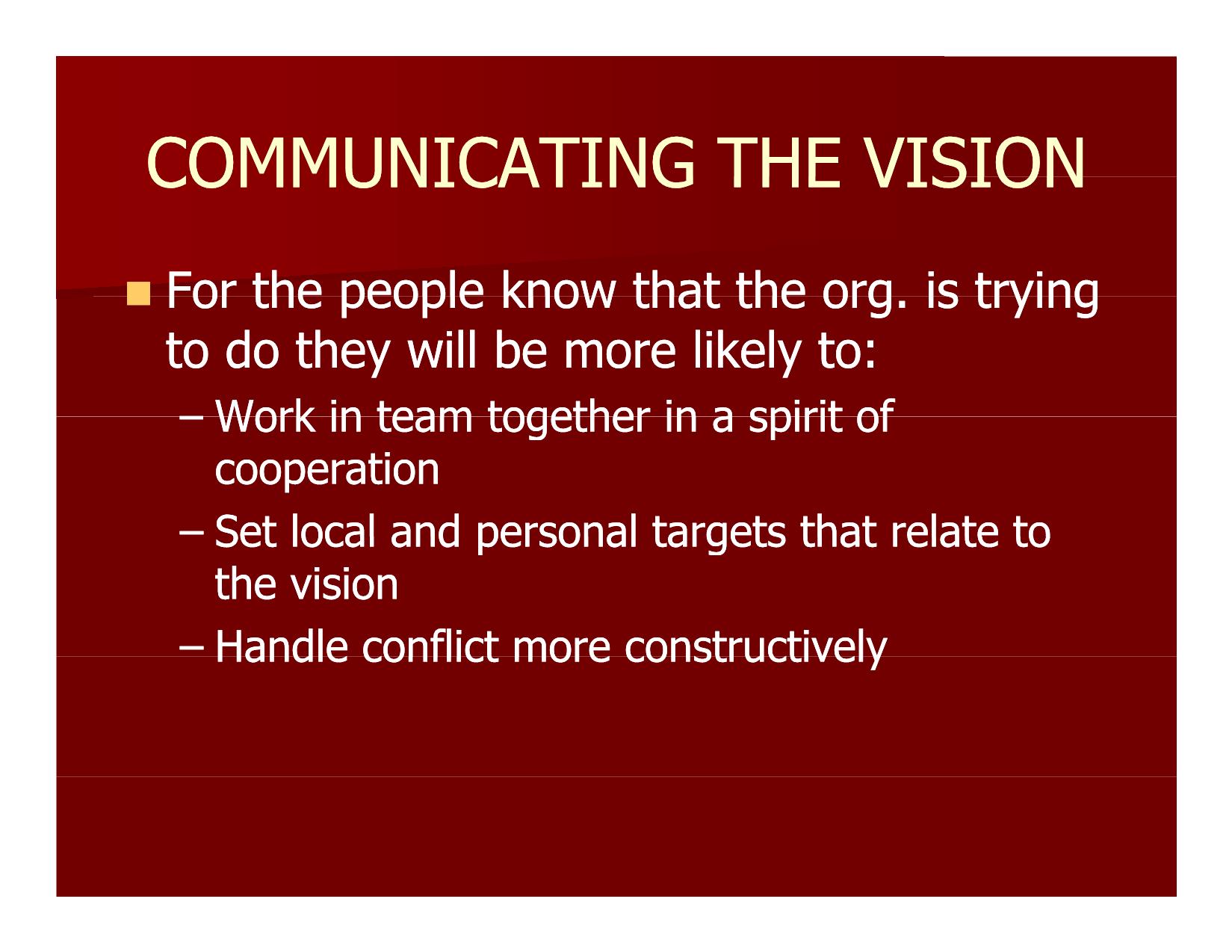
Trang 7
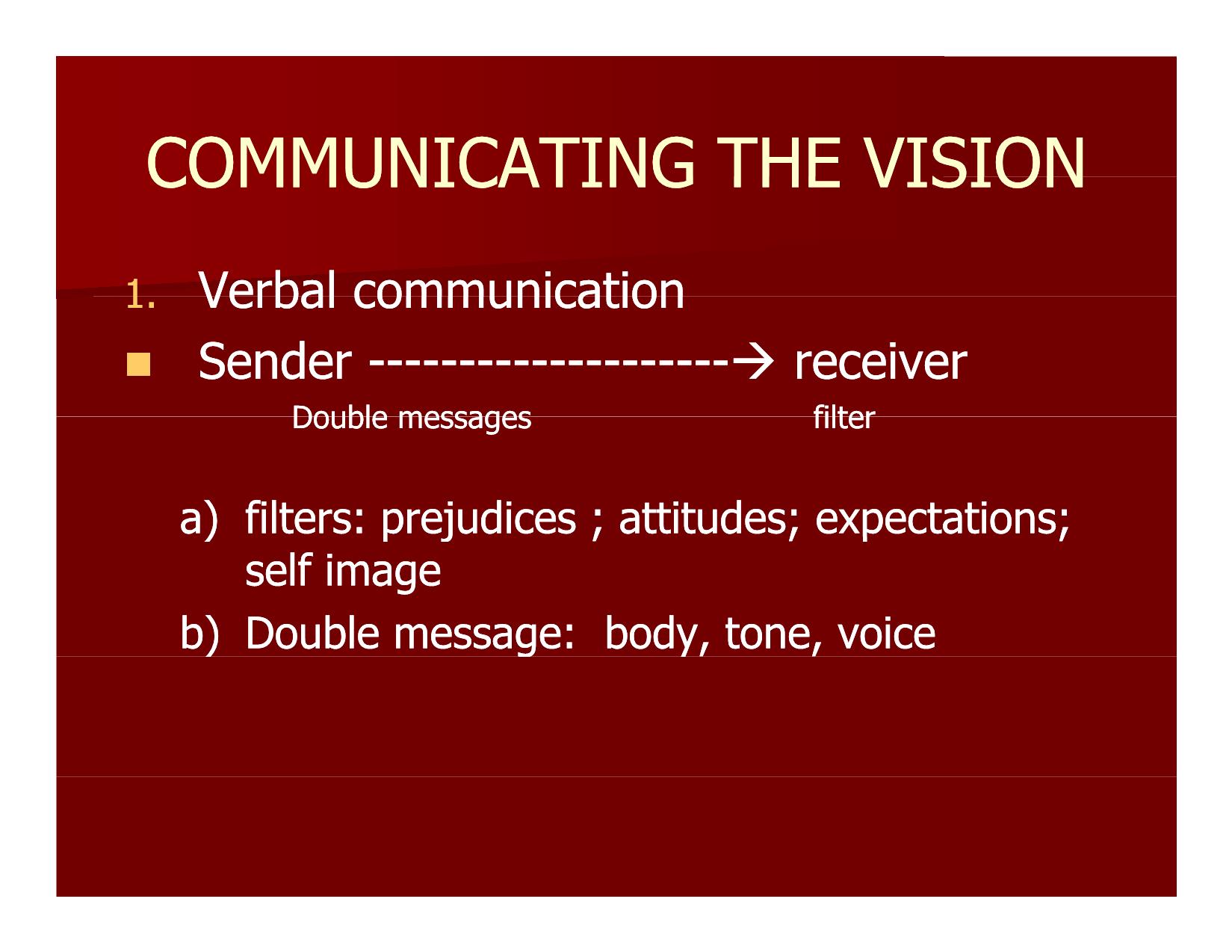
Trang 8
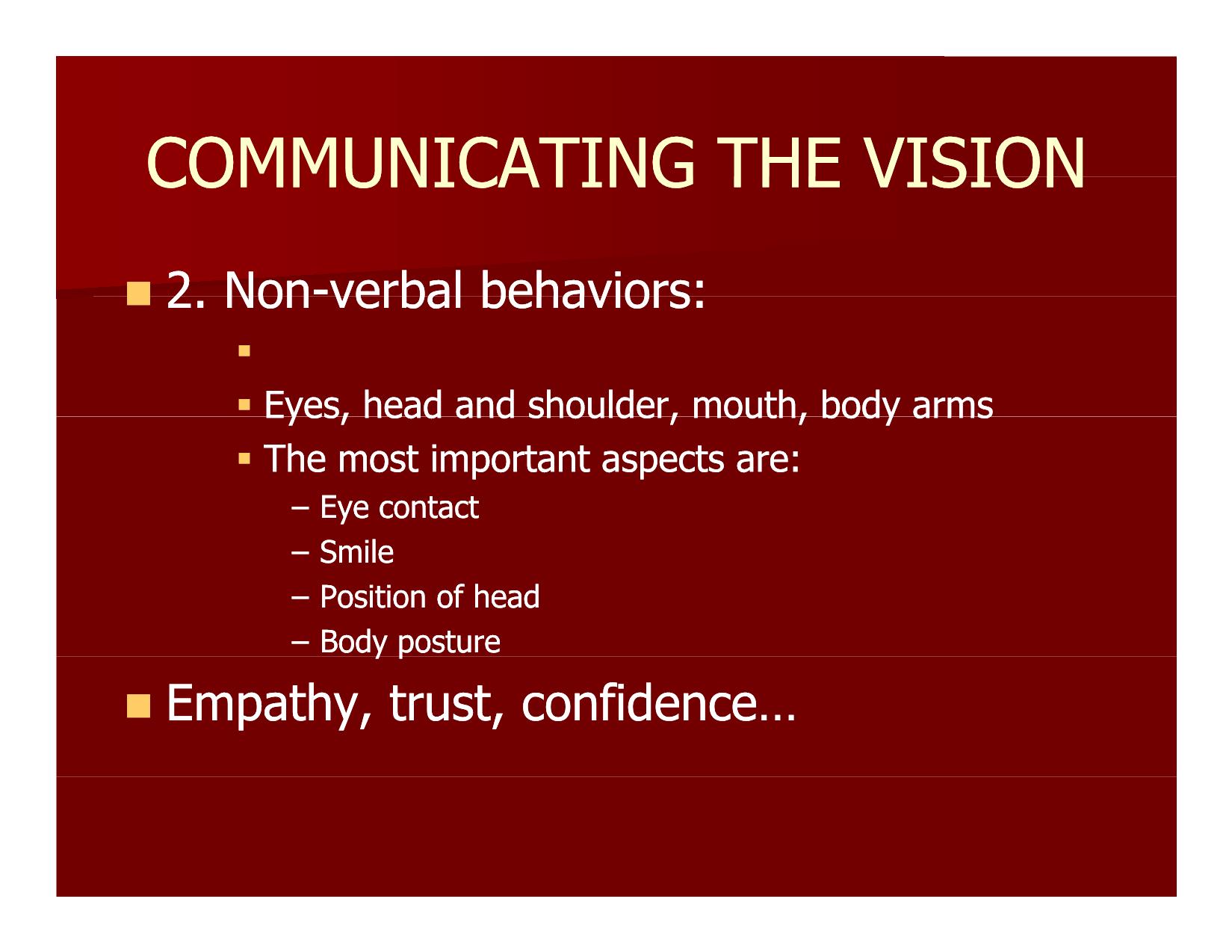
Trang 9
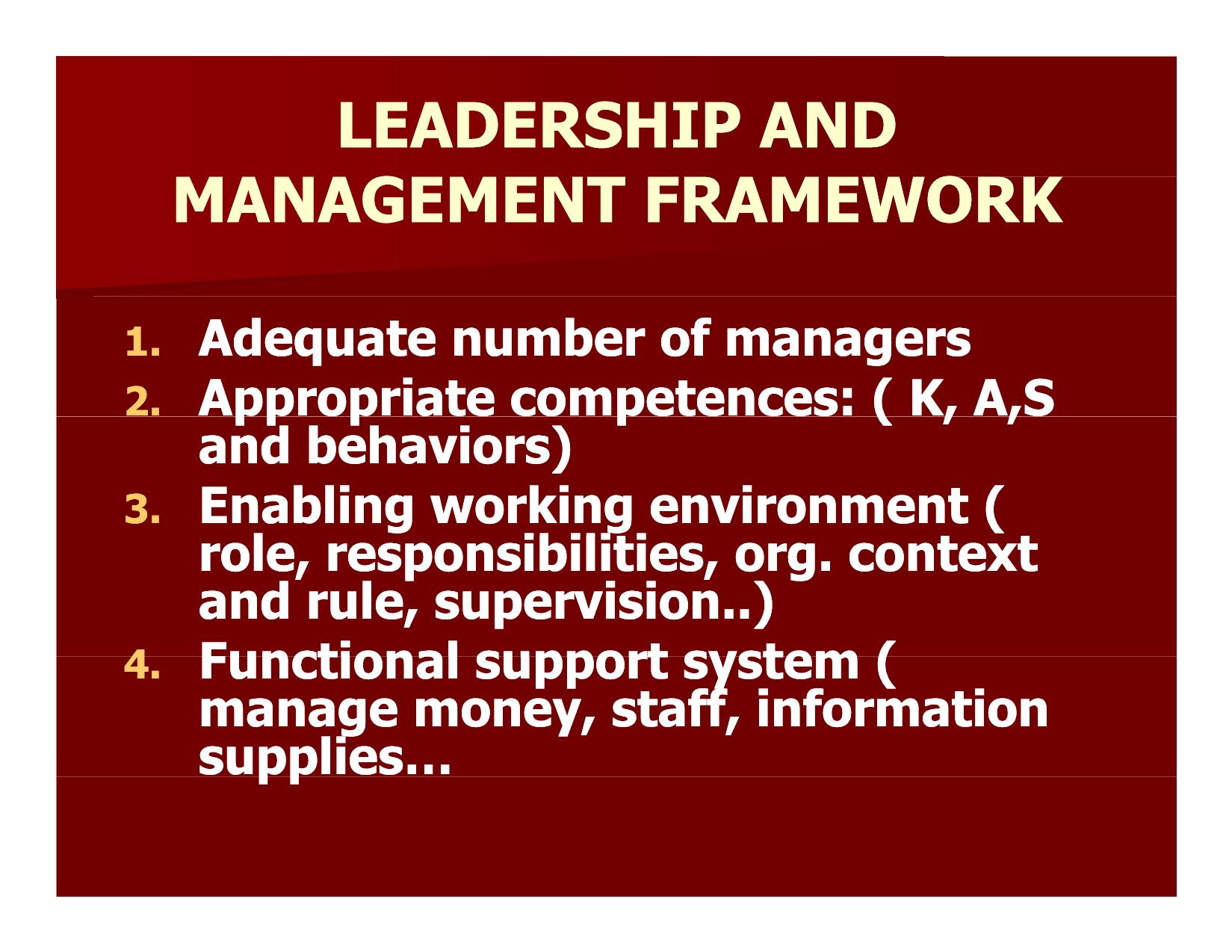
Trang 10
Tải về để xem bản đầy đủ
Tóm tắt nội dung tài liệu: Bài giảng Lãnh đạo - Lê Hoàng Minh
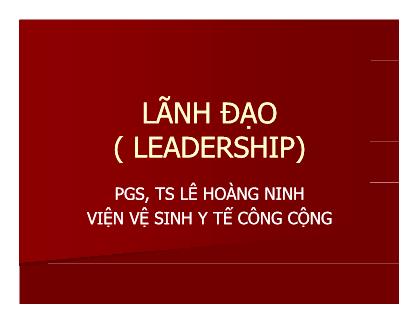
ÃL NH ĐẠO ( LEADERSHIP) PGS, TS LÊ HOÀNG NINH VIỆN VỆ SINH Y TẾ CÔNG CỘNG ĐỊNH NGHĨA Leadership is a word covering the human dimension of activities which initiate and foster the process of change Includes issues such as nature, cultivation of vision and values Understanding why change is needed, how it occurs, the role of leadership in managing and motivating change, importance of shared responsibilities CHỨC NĂNG CỦA LÃNH ĐẠO 1. Conceptualizing/ understanding vision 2. Projecting/ communicating vision in own context 3. Initiating change/guiding change 4. Mobilizing commitment and support for change 5. Managing change-resolve conflicts and issues 6. Building of trust ld b l d l h7. Bui ing sustaina i ity- eve oping ot ers 8. Confidence in one’s vision and oneself Leadership in management Setting goals and objectives Obtaining the commitment of others to reaching them Require not only the manager’s basic ability but in addition the capacity to motivate enthuse energize , , them to work well and willingly towards goals in which they believe “THE CAPACITY TO SECURE THE WILLING SUPPORT OF PEOPLE– IN ACHIEVEMENT OF THE ORG.’S WORTHWHILE” Depend on the exercise of interpersonal influence h h k bl T e proactive approac : ta ing responsi e initiatives to change situaion and attitudes through the people is essence of leadership in management Leadership responsibilities diff l lat erent eve s Different leadership functions evolve according to the leader position and nature of change sought Central level I t di t l l n erme a e eve Community level DEVELOPING A VISION Organizational vision: view of future which leader has committed his energies and enthusiasm to achieving Vi i i ? i l d s on statements are mportant : s mp y an clearly so that reflects the essence of what is required and is not diluted by various conditions and details Mission statement: what business are we in? Visions are derived from ?: analysis of the past, present and future COMMUNICATING THE VISION For the people know that the org is trying . to do they will be more likely to: – Work in team together in a spirit of cooperation – Set local and personal targets that relate to the vision – Handle conflict more constructively COMMUNICATING THE VISION 1 Verbal communication. Sender --------------------Æ receiver Double messages filter a) filters: prejudices ; attitudes; expectations; self image b) Double message: body, tone, voice COMMUNICATING THE VISION 2 Non-verbal behaviors:. Eyes, head and shoulder, mouth, body arms The most important aspects are: – Eye contact – Smile – Position of head – Body posture Empathy, trust, confidence LEADERSHIP AND G OMANA EMENT FRAMEW RK 1. Adequate number of managers 2. Appropriate competences: ( K, A,S and behaviors) 3. Enabling working environment ( l ibiliti t tro e, respons es, org. con ex and rule, supervision..) 4 Functional support system (. manage money, staff, information supplies Ensuring adequate numbers A health manager: is someone who spends a substantial proportion of his/her time managing: – Volume and coverage of service ( planning, implementation and evaluation) – Resources : staff, budgets, drugs, equipments, buildings information, – External relation and partners including service users “ when we talk about manager it is like a , hat which fits all the heads” Appropriate competences “ h l d th i we ave earne e expens ve way that training on its own does not l t bl “so ve managemen pro ems Functional critical support system The main support system are: – Planning – Financial management – Information/monitoring – Human resource management – Management: stock assets ( drugs building vehicles , , , , equipment “ health centers in one country had to record 11 f ll h f d ki d Thi ku s eets o ata every wor ng ay. s too on staff member who had other clinical tasks up to 8 hours a day “ Creating an enabling working ienv ronment The immediate working environment ( within health sector) The wider working environment The broad cultural, political and economic t tcon ex “ We can’t wait until we have a perfect world to do something “ GOOD PRACTICE PRINCIPLES FOR S GLEADER HIP AND MANA EMENT Health outcomes Evidence based Ali d gne Long term Transformational Harmonized
File đính kèm:
 bai_giang_lanh_dao_le_hoang_minh.pdf
bai_giang_lanh_dao_le_hoang_minh.pdf

